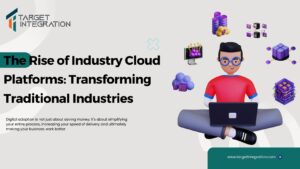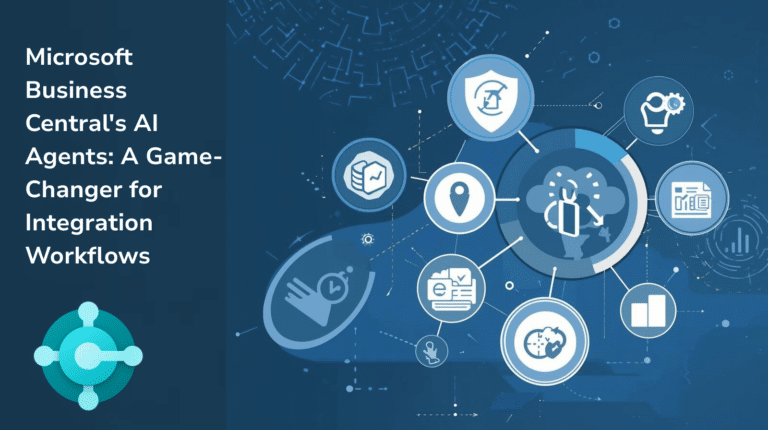Digital adoption is not just about saving money; it’s about simplifying your entire process, increasing your speed of delivery and ultimately making your business work better.
As you start using cloud solutions, you can forget about those old, clunky systems and make it about standing out in the market and getting things done faster. The cloud isn’t just a tool; it’s a way to speed up your plans and simplify how you carry out your business process. That’s why it’s a good idea to use platforms that can handle change in your entire process easily.
Every SME is different in its cloud journey. To speed things up, many businesses like manufacturing, financial services or even life science are using cloud-based platforms, such as enterprise resource planning (ERP). These platforms help you get your products out faster, meet complaince requirement, and keep up with the newest ideas.
So, take a moment to think about how bringing the cloud into your small business can make things smoother and more successful – it’s not just about fancy technology; it’s about making your business work better as the end goal is to maximise your profit with a minimum or no time wasted.
How do the Industry Cloud Platforms function?
Imagine cloud platforms as handy toolkits designed to fit the needs. Let’s take the example of the accounting firms; specifically addressing worries about shaking up established financial services and sticking to the rules. Often, accounting firms are cautious about shifting crucial tasks to the cloud, preferring their own setups to keep control and meet local rules. However, cloud platforms offer a smart solution to these concerns.
Talking about money, these cloud platforms can really cut down costs by ditching the need for big in-house computer setups. This means smoother and more budget-friendly accounting operations. Plus, these cloud solutions come with extra security features to meet all the rules and keeping the data safe, and staying on the right side of financial regulations.
Beyond that, cloud platforms help accounting firms join the digital revolution without causing chaos. It’s about bringing in new digital services, making clients happier, and staying ahead in a changing market. The flexibility of cloud platforms is a big deal, letting accounting firms grow without being tied down by old-school systems.
And don’t worry about things getting too mixed up – these platforms actually help different parts of accounting firms work better together. This includes smoother communication, better connections with clients, and easy use of new tech, creating a more joined-up and responsive accounting setup.
As we move into a new era of accounting with more tech and different client expectations, cloud platforms are the secret weapon for accounting firms to stay sharp, flexible, and client-focused. Shifting to the cloud isn’t just a tech move; it’s a smart step that tackles worries about shaking up established financial services and sticking to the rules, letting accounting firms thrive in today’s financial world.
Industries Have Their Own Needs
Every industry has its own special challenges and rules to follow. In this regard, cloud based solutions can help each industry with what they specifically need. We’ll take a closer look at how tailored services can match up with the unique demands of different types of businesses.
Despite economic uncertainties, 4 out of 5 businesses intend to boost their investments in the cloud.
- Manufacturing Industry
For small manufacturers, the usual struggle involves dealing with disconnected systems that create big gaps and slow processes. That’s where cloud-based ERP systems step in as superheroes. Picture them as super-smart assistants designed to fit the specific needs of small manufacturers.
With cloud-based ERP, small manufacturers can efficiently manage their entire operation. They can easily track inventory levels, ensuring they never run out of crucial supplies. Handling accounts becomes a breeze, with streamlined processes that save time and reduce the risk of errors. Admin tasks, often a headache for small businesses, become more organized and straightforward, allowing them to focus on what they do best – making things.
These tailored cloud solutions are like a one-stop-shop for small manufacturers, providing a unified platform to oversee everything. No more juggling different systems that don’t talk to each other. It’s about making manufacturing work better for the little guys, giving them the tools to manage it all seamlessly and efficiently. So, for small manufacturers, the key to success lies in embracing cloud-based ERP systems, unlocking a world where managing inventory, accounts, and admin tasks is as easy as a few clicks.
- Financial Services industry
Keeping up with rules, changing how you work, and making customers happy can be a real headache in the financial world. Add in clunky mobile apps and the worry of security issues, and things get even trickier.
But what if we told you there’s a solution that can address these pain points head-on? Embracing the cloud is more than a technological shift; it’s a strategic move to navigate the changing tides of your industry.
The cloud offers a competitive edge, facilitating a cultural shift in how you operate. Tailored solutions ensure regulatory compliance, helping you adapt your business model to meet rising expectations and retain valuable customers.
- Life science
If you’re struggeling with complex transactions and spending too much time on data uploads, we’ve got a success story to share that might resonate with you.
Take AMSBIO, for example. They navigated similar challenges but found a solution with TI. Together, we automated their inter-company transactions, simplifying the tracking of goods, transaction confirmations, and product data management. The multi-company strategy of a cloud based ERP and in this case – Odoo made it a breeze for AMSBIO to organize documents related to specific entities, and seamless software integration ensured operations ran smoother than ever.
We understand the struggles. But imagine a world where your transactions are automated and data uploads take minutes instead of hours. That’s where we come in – just like how TI’s developers created a custom for AMSBIO, we can tailor solutions to streamline your operations, making them more efficient and less time-consuming.
- Telecommunication
Telecom companies are focusing on the next big thing in connectivity—5G and even more advanced technologies. Making 5G work well depends on having a smart plan for using multiple clouds, ensuring that connectivity services run smoothly, and new exciting features keep coming. It’s like making sure your phone can do amazing things and stay connected in the best possible way, and that’s what these telecom companies are all about—bringing you the next level of connectivity and value.
Technical Insights and Profiling
Industry clouds platforms serve as a blessing for enterprises, fostering increased agility, expediting innovation, and accelerating the reali of value by transforming traditionally procured cloud services into adaptable, industry-specific solutions. This transformative approach not only enhances the end-user experience but also propels business revenue growth, fostering a rapid digital evolution.
Enterprises can leverage the packaged business capabilities (PBCs) offered by industry cloud platforms as foundational building blocks to craft unique and distinctive digital initiatives. By tapping into the business advantages of industry cloud ecosystems, the collaboration of independent software vendors and system integrators with cloud providers emerges as a pivotal avenue through which industry cloud platforms deliver substantial value. This collaborative synergy not only enriches the overall industry cloud experience but also positions these platforms as essential contributors to the digital acceleration journey for enterprises.
Moving gorward
When it comes to using industry cloud platforms, companies should see them as helpful additions, not complete replacements for big, outdated systems. It’s about blending what already works with new, useful tools.
To get everyone on the same page, businesses should involve both tech and business experts, forming teams that work together well. And if these teams don’t exist yet, it’s time to create them.
For things to run smoothly and stay up-to-date, companies need clear rules and plans. Using industry cloud platforms should be about making processes better or replacing them when it’s the right time. This includes making changes for the better and trying out new, creative ideas.
Industry cloud platforms are like secret weapons for many companies. They offer flexible solutions that match what businesses need, making it easier to use new technology. These platforms speed up the use of cloud services, bringing in cool stuff like industry-smart data systems that really catch the attention of everyone involved in the business, not just the tech experts. To really get the most out of these platforms, they should evolve into something called ecosystem clouds. This means companies can join in on shared processes like buying things, delivering them, handling payments, and even working together on new ideas and improvements. It’s like creating a community where everyone benefits.
Get in touch to find out more about digitalising your business




